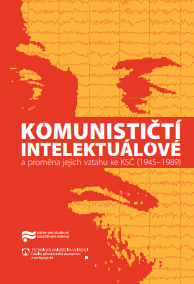
We kindly inform you that, as long as the subject affiliation of our 300.000+ articles is in progress, you might get unsufficient or no results on your third level or second level search. In this case, please broaden your search criteria.

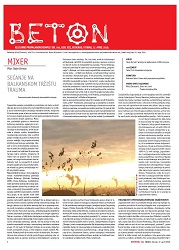
MIXER, Stejn Vervat: Sećanje na balkanskom tržištu trauma; antiCEMENT, Saša Ćirić: Kanadska inicijacija; ARMATURA, Adriana Sabo: Čemu služi populaciona politika; VREME SMRTI I RAZONODE, Miloš Živanović: Sever mi u krvi, Psalam konjskog lika
More...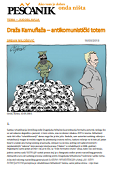
Sudska rehabilitacija četničkog vođe Dragoljuba Mihailovića predstavlja formalnu potvrdu nečega što se već odavno dogodilo u javnosti. U tom smislu, ona ne donosi nikakvu bitnu novinu. Mihailović neće biti ništa “rehabilitovaniji” danas nego što je bio juče. Doduše, sam autoritet sudskog rešenja o rehabilitaciji mogao bi možda negde da predstavlja izvesnu težinu, kada to rešenje ne bi bilo još jedan bizarni uradak posrnulog srpskog pravosuđa, sklepan na osnovu jednog od najbesmislenijih i najskarednijih “zakona” koje poznaje istorija prava (“Zakon” o rehabilitaciji iz 2006. godine). Pogledajmo samo jedan primer: šta je to što, sa “čisto formalne strane” (koja, kako nas uverevaju, jedino zanima sud) razlikuje sudski proces koji je u Beogradu vođen protiv nacističkog generala Aleksandra Lera od sudskog procesa vođenog protiv Dragoljuba Mihailovića? Suštinske razlike nema. A šta deli rečenog nacističkog generala od sudske rehabilitacije u Srbiji, po istim kriterijumima po kojima je rehabilitovan Mihailović? Zaista, samo jedna sitnica – nije imao “prebivalište na teritoriji Republike Srbije”.
More...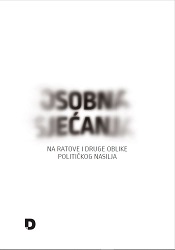
O snimanju osobnih sjećanja sanjali smo i prije osnivanja Documente kad smo se pitali kako produbiti i intenzivirati društveni dijalog o nasilnoj prošlosti na prvom mjestu kako bismo sačuvali osobna sjećanja. Prvi smo upitnik za polustrukturirane intervjue pripremili 2002. godine.01 Najvažnija je svrha bila i ostala sačuvati jedinstvene neponovljive priče naših suvremenika za nas i neke druge generacije. Smatram da u stvaranju društvenog pamćenja ništa ne može zamijeniti ljudsko svjedočanstvo i nadam se da će zbirka intervjua i sačuvana sjećanja pomoći i u promociji višeglasja kontra jednoumlja, promociji multiperspektivnosti u interpretaciji povijesti kontra kanoniziranju samo jedne dominantne interpretacije te promociji višeslojnosti povijesnih zbivanja kontra ratovanja oko pojednostavljenih crno bijelih interpretacija, a uz povoljniju društvenu klimu možda i afirmiranju višestrukih identiteta.
More...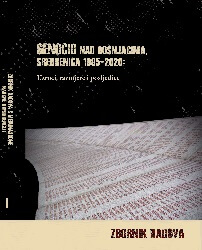
Moralno-pravna i politička obaveza svijeta Evropske unije i Bosne i Hercegovine jeste ne samo spriječiti buduće, civilizacijski katastrofične i neprihvatljive zločine poput genocida nad Bošnjacima u Srebrenici i oko nje nego, i prije svega, spriječiti njegovo planski aktivno i političko, medijsko, kvazinaučno, sistematsko poricanje i negiranje, kakvome svjedočimo danas i svih poratnih godina u Bosni i Hercegovini i njenom susjedstvu. Tačnije Srbiji, koja je imala “političko mentorstvo” nad genocidom, uporno pokušavajući izbjeći ono neizbježno – svoju vlastitu odgovornost za plansko, praktično učešće i političko i vojno saučesništvo koga je potpuno svjesna. [...]
More...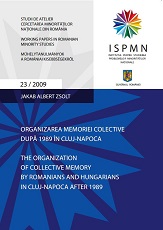
Transylvania, annexed to Romania in 1920, is a place of continuous Romanian-Hungarian conflicts. There is always a domain of conflict between the Hungarian minority and the Romanian majority represented by the construction, the invention and commemorative use of the past. In my ethnographic and socio-anthropologic analysis I focus on the "memory entrepreneurism", and foreground those interethnic relations and symbolic behaviours that stand behind it in the social context of the multiethnic Cluj-Napoca. The change of regime of 1989 brought along not only a political closure, but also one with on the framework of the imagined past. On the social level this resulted in the drama of the diminuation of belief in the institutions and authorities. The past constructed up to that point naturally lost its political legitimacy. There were two kinds of attitudes emerging within the self-legitimating strategies regarding the past. On the one hand the denial of continuity, the rejection of the past constructed by previous societies in the interest of the new historical order. This new historical order didn't wish to continue the previous economical, social and political relations. But on the other hand, in there was a rising need for historical depth: how can one legitimate the present and create a continuity in the historical space? Nevertheless, the new system considered it necessary to deduce the new social order from history. It had a need for the past also because it defined itself against the past, distancing itself from it: thus the past became surpassed and at the same time an example to follow. The period between 1989 and 2008 proved to be one of the most productive regarding the local construction of memory. Therefore my paper analyses the tendencies of post-1989 past construction. What previously exposed component of the past was made invisible by the new system? What was overtaken and what kind of new components were brought to the surface? What kind of conflicts were revealed, what kind of identity strategies, legitimating processes and national discourses were put into motion by the construction of the (new) memory?
More...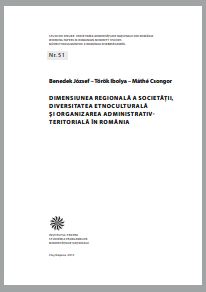
The present study is a primary effort to identify and decript the identitary dynamics of the two most ancient ethnic communities of Romania, the Turks and Tatars. As a context framing, the paper shows the historic and demographic evolution of the Turks and the Tatars all throughout the 20th century. Chronologically, the emphasys falls upon the communist period, to better envisage the way in which political, economic and social changes in the era were reflected in the ethnic and religious structures of the Turks and the Tatars in Dobrogea and consequently to extend on identitary evolutions after 1990. By adding the archive research to journalistic text analysis and field research (interviews, participative observation), the study traces the memory patterns of the communist period, the types of relations and attitudes created in relation to the regime, together with the evolution of self-image and image of the other (Turk-Tatar), generated by the main identitary landmarks: ethnicity, religion, origins, mother tongue and traditions, inside the socialist society as well as after the fall of the communism.
More...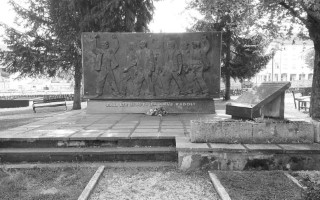
U rujnu 1994. godine tadašnji dalmatinski župan Kruno Peronja, član HDZ-a, poslao je općinskim načelnicima interni dekret čiji je sadržaj bio sljedeći: „Pošto dobijete potrebito stručno mišljenje, temeljem istog na sjednici Vašeg poglavarstva donesite odgovarajuće odluke o skidanju spomen ploča i obilježja s javnih mjesta, te sukladno dobijenom stručnom mišljenju, njihovom sklanjanju u odgovarajuće prostore radi svjedočenja o vremenu koje je, na sreću, iza nas. Poglavarstva za tu namjenu trebaju osigurati sredstva za pokriće troškova skidanja i sklanjanja u namijenjene prostore, te odrediti poduzeće, radnju ili djelatnika koji će za te poslove biti ovlašteno te ih obaviti najkasnije do 31. listopada 1994.“
More...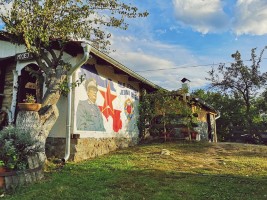
Ako postoji nešto što je suvremena Hrvatska patentirala kao vlastiti izum, s čitavim nizom inovacija, to je obračun s neželjenom spomeničkom baštinom. Jasna stvar je da neželjenu spomeničku baštinu predstavljaju u prvom redu spomenici posvećeni Narodnooslobodilačkoj borbi, potom oni koji se odnose na baštinu Srba u Hrvatskoj, zatim oni koji na bilo koji način slave jugoslavensku ideju te na koncu oni posvećeni lijevoj tradiciji i ljudima s ljevice. Ukoliko je pak riječ o kombinaciji dva ili više navedenih faktora, što je prilično čest slučaj, takvi se spomenici uklanjaju s dodatnim guštom. Povod za nastanak ovog teksta su dva aktualna slučaja. Prvi, u kojem je HDZ-ov načelnik ličke općine Perušić, koristeći sumanute i kontradiktorne izgovore, odlučio iz središnjeg gradskog parka ukloniti partizanski spomenik, koji je ujedno kosturnica, zbog navodne rekonstrukcije parka i pretvaranja istog u dječje igralište, s idejom da ga premjesti na zabačenu lokaciju. Drugi se odnosi na Zadar, u centru kojeg je, ako ste sumnjali, u sklopu projekta rekonstrukcije parka upravo uklonjen spomenik osnivanju prve ćelije KPJ u tom gradu, ovdje pak s idejom gradonačelnika da se spomenik smjesti u muzej.
More...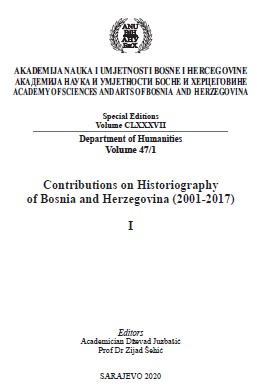
Aggression was clearly defined in international law in December 1974 by a resolution of the UN General Assembly. In each of the theoretically established stages of armed aggression, which, without exception, imply the widespread use of state power, determining the existence of a crime is an extremely complex legal issue, further complicated by the accompanying political connotations. In post-conflict societies, such as contemporary Bosnian-Herzegovinian society, the whole issue is much more complex. We considered in which directions the scale of value judgments shifted regarding the character of the war that lasted from 1992 to 1995 from the end of the war to the present. For different tendencies of attitude towards this issue in the historiographies of Bosnia and Herzegovina and its surroundings, we have indicated descriptive frameworks, highlighted the main characteristics and differences between them.
More...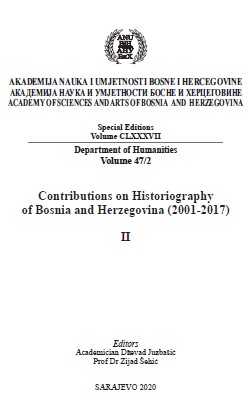
This essay comparatively examines explanations of the anniversary celebration in Bosnia and Herzegovina in between the last thirty years. The author set before themselves the task of analyzing the role of media in the public, as a part of historiography as a legacy. In that manner, understanding the role of media in public opinion is unthinkable without research about their background. The research result shows a situation in which the media are subject to constant propaganda based on prejudice or ethnic divisions. It is necessary to return the foundations for independent journalism from the beginning. In theory, the media are a means of accurately and timely informing the public about all events and processes in society. The media on this occasion should witness events that objectively and responsibly convey their knowledge. In practice, this theory is not applicable even in much more developed countries, with far fewer socio-political problems. The media reality of Bosnia and Herzegovina is filled with various forms of bad reporting, hate speech primarily in its worst form. In thirty years, this kind of media will be a supplement for researchers to complement the next-generation research process. The only solution is to establish ethically responsible journalism, which must have support of the scientific community.
More...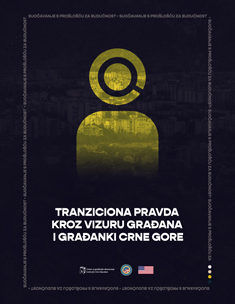
Istraživanje javnog mnjenja o znanju i stavovima građana i građanki Crne Gore o ratnim zločinima i tranzicionoj pravdi sprovedeno je radi dobijanja godišnjeg presjeka podataka. Podaci su upoređivani, u dijelu istih pitanja, sa prošlogodišnjim sličnim istraživanjem Centra za građansko obrazovanje (CGO). Dodatno, po prvi put su unešena i pitanja koja osvijetljavaju percepcije građana i građanki o odnosu pravosuđa i određenih državnih institucija prema ratnim zločinima. Ovakvo redovno praćenje znanja i stavova javnosti daje i koristan uvid o efektima rada različitih društvenih subjekata u procesu suočavanja s prošlošću. Takođe, na ovaj način se dobija empirijska građa o ključnim pitanjima koja su obilježila politički i društveni životu protekloj godini, a vezana su za ova proces, i kakav je to uticaj imalo na društvo.
More...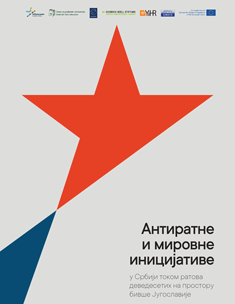
Један од основних предуслова за миран и просперитетан живот у савременом друштву је мир. Мир обезбеђује услове за економски и привредни развој и општи друштвени напредак. Доприноси том циљу могу бити различити, а један од њих је могућ кроз образовање за мир. Учење о миру обухвата знања о мировним покретима, антиратним иницијативама, алтернативним начинима превазилажења и решавања сукоба, чињенице о разоружању, животној средини и одрживом развоју, људским правима, другим културама и религијама, различитостима и др.
More...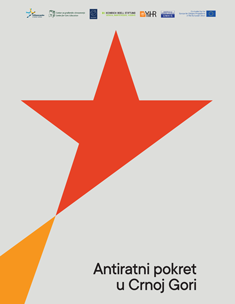
Od samog početka ratnih dešavanja na prostoru bivše Jugoslavije, crnogorske vlasti su se stavile na raspolaganju režimu Slobodana Miloševića. Sprovodeći politiku zvanične Srbije i JNA (kasnije Vojske Jugoslavije) crnogorsko rukovodstvo se oštro obračunavalo sa političkim neistomišljenicima i svojim oponentima. Osudama vladajućeg režima bili su izloženi protivnici rata (“domaći izdajnici”), zagovornici crnogorske nezavisnosti (“separatisti”) i kritičari aktuelnih političkih trendova.
More...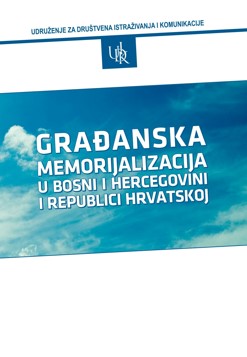
Since its foundation, along with field visits of places of suffering, the Association for Social Research and Communication has been working on collecting data on monuments built in local communities, which are dedicated to the wars of the 1990s. Thus, in 2016, UDIK presented the Central Register of Monuments in Bosnia and Herzegovina, which contains data on more than 2,100 memorials, while in 2017 UDIK's team mapped over 1,200 memorials in the Republic of Croatia. This booklet provides a brief overview of developments on the issue of memorialization and the basic findings of UDIK's research on monuments in both countries.
More...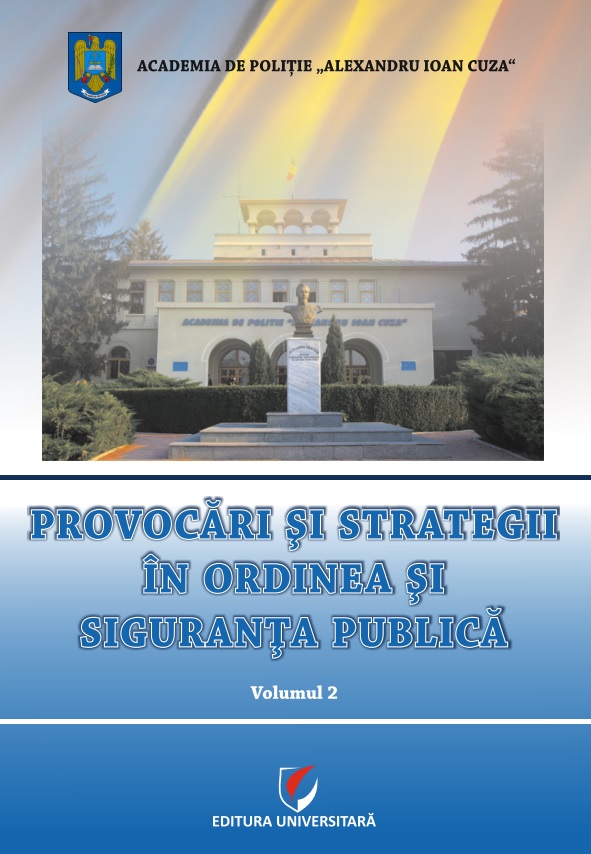
Nowadays, social media represents the place where all the activities of an individual take place (from opinions about an event, musical preferences, intentions, public debates to passions), he presents and transpose his life from the real world to the virtual one. At the same time, social media is a threat to security, being a method by which terrorist activities, riots, abuses are organized and coordinated. In order to understand the new security environment and to respond to the challenges, the intelligence services introduced the concept of Social Media Intelligence, through which they can understand and prevent events, can analyze the mood of the society and its preferences.
More...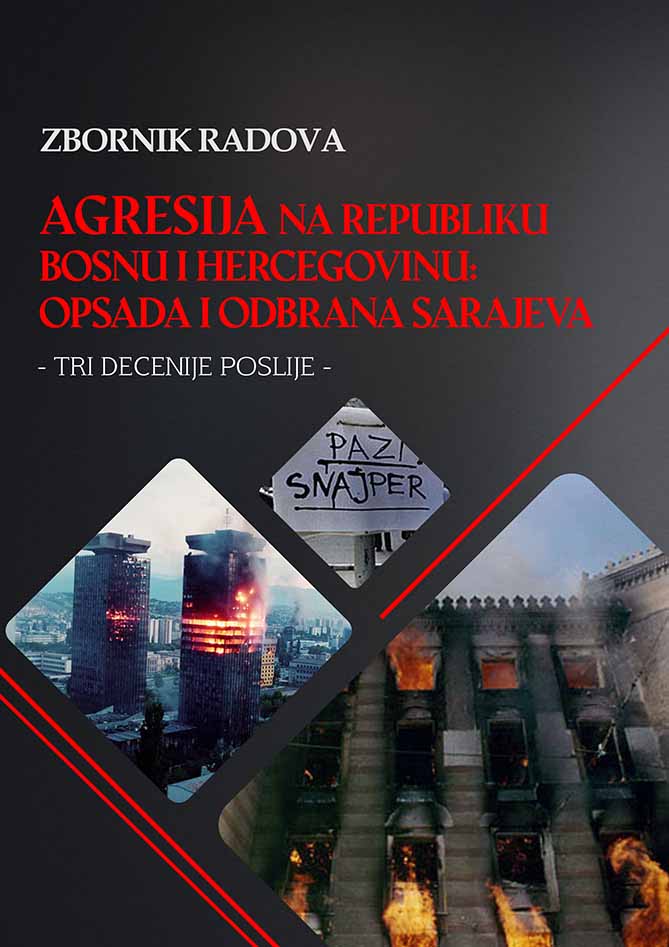
Ever since Tito’s death in 1980, the socialist Yugoslavia was going through difficult political, economic, and social temptations, involving ample domestic and international actors, along with the accompanying consequences of the era change of on a global level. The Yugoslav state crisis should be observed in a broader context which will provide a more complete answer. The remaining two fundamental pillars of the Yugoslav federation – Yugoslav Communist Party (SKJ) and Yugoslav National Army (JNA) ‒ were undermined in early 90’. The then republics’ elites, guided by partial interests, mutually confronted to one another, were not ready to adequately face the challenges of democratization that captured the Eastern euripi following the fall of the Berlin Wall in 1989. The Yugoslav republics took numerous legal steps towards strengthening their own sovereignty. The crisis culminated in 1991 with the separation of Slovenia and Croatia from Yugoslavia, and the armed conflicts that followed. Confronted with the new legal and political surrounding, Bosnia and Herzegovina also began with the revival of its independence. This path proved to be extremely difficult and challenging, mainly due to the revived great-Serbian and great-Croatian attempts to divide Bosnia and Herzegovina, particularly expressed in 1991 during the negotiations between Slobodan Milošević, president of Serbia, and Franjo Tuđman, president of Croatia. In early days, these plans, with a strong support of regime affiliated media from Belgrade and Zagreb, manifested in form of numerous obstructions in the operation of the highest authorities in Bosnia and Herzegovina, promotion of a thesis that Bosnia and Herzegovina cannot survive as an independent political entity, establishment of illegal Serb communities of municipalities and regions, and then Serb Republic of Bosnia and Herzegovina, and Croat ones in form of regional communities, whereby the most significant one was Herzeg Bosnia. In such complex circumstances, and in line with the recommendations of the Badinter’s Commission, referendum on independence was organized in 1992, when the citizens firmly voted in favor of independent Bosnia and Herzegovina. European Community recognized Bosnia and Herzegovina on 6th of April, while the USA did it on the following day. In conditions of aggression and four year long war destruction, a new chapter in legal and state development of Bosnia and Herzegovina began.
More...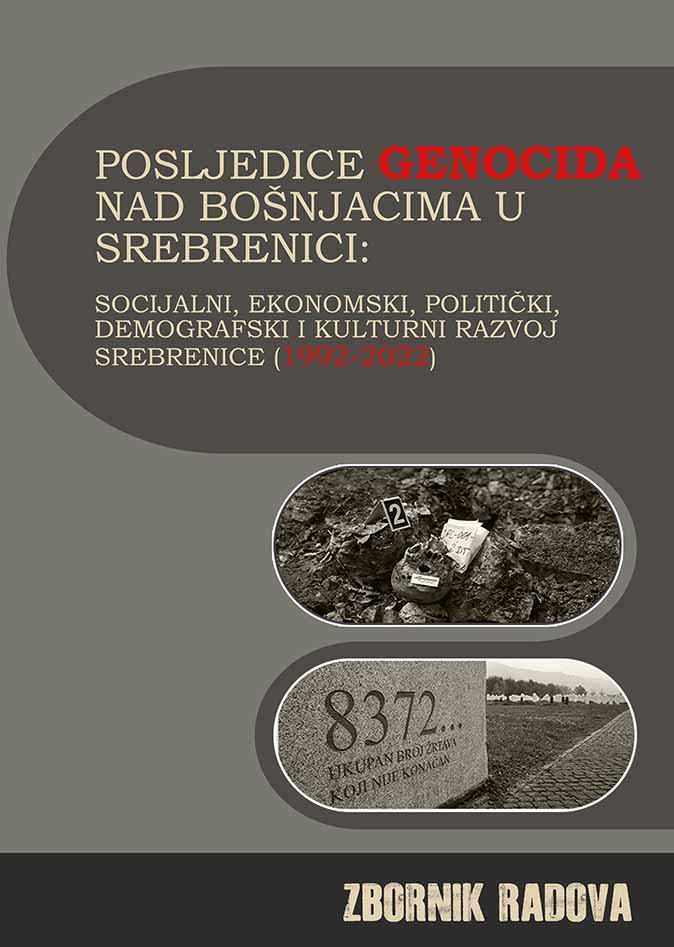
Introductory remarks by: - Prof. Ph.D. Rifat Škrijelj, rector of the University of Sarajevo - Prof. Ph.D. Dženeta Omerdić, Presidency of Bosnia and Herzegovina (Office of Dr. Denis Bećirević) - Prof. Ph.D. Denis Zvizdić, Deputy Speaker of the House of Representatives of the Parliamentary Assembly of Bosnia and Herzegovina - Ph.D. Pavle Krstić, Minister (Ministry of Higher Education, Science and Youth of Sarajevo Canton) - Ph.D. Husein-ef. Kavazovića, reisul-ulema (Islamic community in Bosnia and Herzegovina) - Academician, prof. Ph.D. Mirko Pejanović (President of the Scientific Committee of the Conference of the Academy of Sciences and Arts of Bosnia and Herzegovina) - Ćamil Duraković (Vice President of the RS entity) - Prof. Ph.D. Rasim Muratović, Director of the Institute for Research of Crimes Against Humanity and International Law, University of Sarajevo - Ph.D. Sc. Sedad Bešlija, director of the Institute of History
More...
Moralno-pravna i politička obaveza svijeta i Evropske unije i Bosne i Hercegovine jeste ne samo spriječiti buduće, civilizacijski katastrofične zločine poput genocida nad Bošnjacima u Srebrenici i oko nje nego, i prije svega, spriječiti njegovo planski aktivno i politički, medijski, kvazinaučno, sistematsko poricanje i negiranje. Tome svjedočimo danas i svih poratnih godina u Bosni i Hercegovini i njenom susjedstvu. Umjesto odgovornosti za nesprečavanje genocida, u Srbiji se i dalje veličaju ratni zločinci koji su doveli do izvršenja genocida. Upornim i neskrivenim javnim veličanjem zločina i međunarodno presuđenih ratnih zločinaca, praveći od njih nacionalne heroje s jedne, i stigmatiziranjem kritičkoga govora i priznavanja genocida od strane grupacija ili pojedinaca u njihovom javnom angažmanu na tu temu, s druge strane, ohrabruju se politike i zagovornici opetovanja genocidnog zla i njegovo javno, nekažnjeno, stadionsko i medijsko veličanje, poput transparenata tokom utakmica na kojima se zanavlja napis: Nož, žica, Srebrenica.
More...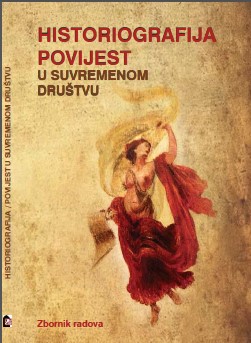
Author analyzes discursive praxis in confronting the past and reasons why such approach is considered as a stabilizing concept within historiography. The example of holocaust and its implementation within national and transnational memory of the entire humankind shows how history and memory coexist. Namely, a historiography is inspired by a new model of ethical awareness that imposes revealing of a negative memory in order to avoid repetition and manipulation of the remembrance, especially regarding possible retroactive justification of historical crimes. Generally speaking, such a concept of confronting the past opens question about “negative memories”, and maintains idea that not speaking about historical evil enables its possible return in the future. From the perspective of historical memory one can say that historiography today emphasizes its ethical orientation. Historians today do not have a monopoly on interpreting the past, and this fact enables dialogue between historiography and other scholarly disciplines. Namely, during the last twenty years many sociologists, anthropologists, psychologists, literary scholars and philosophers contributed a lot in the investigation of contradictions and anomalies that accompany transformation of a living communicated remembrance to the commemorative and institutionalized memory. The question of transformation of individual remembrance to collective memory is rather well investigated in the relation to the meaning and significance of social obligation towards a social group, especially regarding question of merging or debarring of certain memories. Author also points out some examples of making the memories in Croatia during the transition period in 1990s’. Moreover, question of rememorizing the World War Two (1941-1945) is discussed in comparison to the rising of social importance of the remembrance of the Homeland War (1991- 1995), especially in the relation to the decisions of the International Criminal Tribunal for the former Yugoslavia. The fall of the Berlin wall in 1989 and collapse of communism in the Central and South-Eastern Europe provoked numerous nationalistic re-interpretations in the small local historiographies. Consequently, some of the Croatian historians during 1990s’ treated their nation as a victim, and confronting the past was rather strongly present in the investigation of victims of communism 1945- 1990, which was necessary at that time because of the need to create a social balance. Nowadays some recent studies show that Croatian historians are more open towards new theoretical approaches within the research field of culture of remembrance. Finally, there is an open question of memorial function of the Homeland War 1991-1995. Namely, many analysts think that international justice has failed in the case of processing crimes during the Yugoslav war. If the International Court of Justice took more clear and undisputable position regarding crime against peace that was committed by Milošević’s Serbia during the aggression to Croatia and Bosnia and Herzegovina, we could do much more effective work regarding negation of mass crimes and recurrence of genocide in Europe.
More...